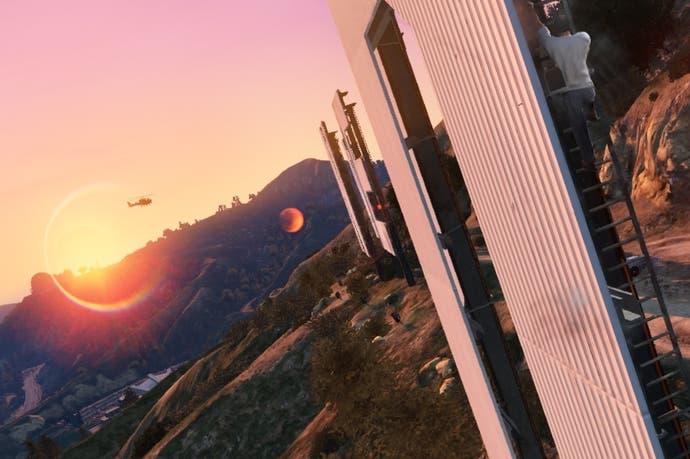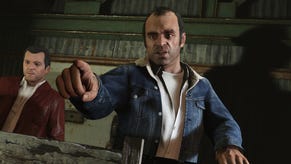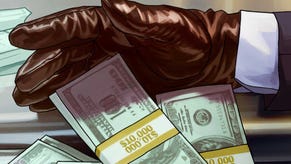Why Grand Theft Auto 5 has to be a comedy
It's the only genre left standing.
Comedy, according to Martin Amis, is the only genre left standing. Faced with the kind of world we live in, history and tragedy just won't cut it any more.
He was talking specifically about novels, of course, but I think the same is true for open-world games. People used to regularly bemoan the fact that games, by and large, rarely make you laugh, but open-worlders have the opposite problem - they have trouble giving you time to dry your eyes and regulate your breathing so they can make you do anything else.
This is why Grand Theft Auto 5 was always going to work best as a comedy, and why, when I watched yesterday's gameplay reveal, I was delighted by just how good a comedy it might be.
There are two levels of comedy at work, perhaps: on one level, it's a comedy for Amis's reasons, which are similar to the reasons Tom discussed a few months back. It's a comedy because it's a satire of a contemporary world that already looks pretty insane no matter how you view it. It's Michael Lewis economics, PRISM government and D-listed celebrity culture converging.
Beyond that, though, it's a comedy because its own world, regardless of satirical intent, is so naturally rigged for pratfalls and happy accident that you might as well enjoy the laughter that you're inevitably going to create.
Open worlds tend to be funny because they're large spaces which have a series of systems placed on top of them. They get funnier the more systems are added and the more those systems are allowed to overlap. On the most basic level, there's nothing particularly amusing about street corners, say, unless you're in Shoreditch and you're unusually committed to hipster typology. But when you layer on traffic and pedestrian systems and then you allow me to steal a car and drive it badly, funny things are probably going to occur regardless of how many Shoreditch hipsters are standing nearby comparing out-of-season Christmas jumpers.
Yesterday's GTA5 trailer was extraordinarily promising on this emergent level. Just look at all these crazy mechanics ticking away within the game: story missions, cars, planes, character evolution, the stock market. Anyone for tennis? Great things are likely to spill forth when all these elements collide. The more systems you have, the more gears you're allowing to grind against each other, and the more sparks are going to fly.
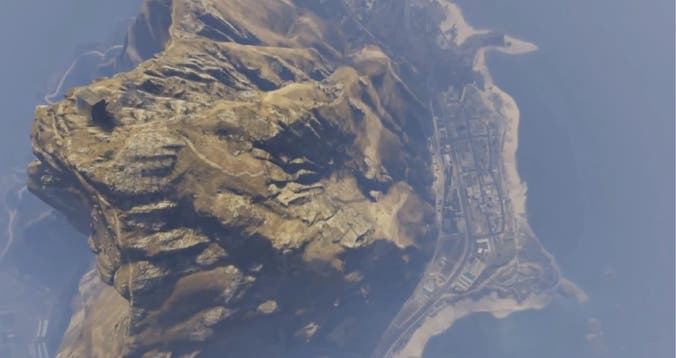
Truth be told, this kind of comedy is going to thrive no matter the approach you take elsewhere. The first Saints Row wasn't officially a comedy video game if I recall correctly - it was just a really badly made open-worlder in which latent comedy was itching to burst forth. Subsequent instalments have been more knowing, perhaps, and they've certainly been more extreme, but it's arguable that they haven't actually gotten that much funnier. The fender benders, weird body physics and disappearing geometry has been hard to trump, and these things haven't bothered to read the script anyway.
Equally, while it's nice to see GTA5 aiming for a kind of big-budget HBO take on Palookaville with its cast of off-beat cops and robbers trading one-liners in the kitchen, on the toilet and midway through a heist, moody old GTA4 was already funny for a host of conveniently forgotten reasons, like the way Roman pratfalls around mob bosses like Jar-Jar Binks stumbling into Goodfellas' Copacabana and pinning a clown nose on Joe Pesci. LA Noire was a comedy because of all those things that happened when driving between fist fights. As Aaron Staten put it, not everything will be relevant.
Even an open-worlder as seemingly mirthless as The Saboteur was a comedy, really, despite the fact you were fighting Nazis in occupied Paris. I remember leaving a secret resistance meeting in a dingy part of La Pigalle, turning a corner and seeing all my co-conspirators sat in separate Citroens that they'd lovingly driven up a selection of different walls. These people were going to save Europe, and yet here they were, smiling blandly as they tried to gear-change their way out of a muddle of guttering.
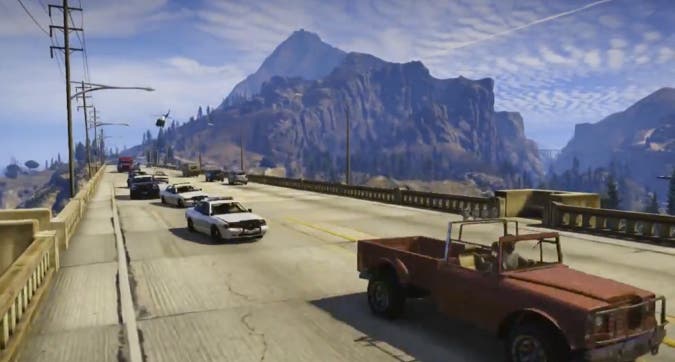
Ultimately, I guess comedy is a bit like entropy in open-world video games: it's the babbling chaos into which all closed systems are just aching to devolve. This ache is so strong, in fact, that to tell even a halfway managed story, open-world designers don't just have to build their playgrounds, they have to work as their caretakers and sanitation engineers, too, fixing pile-ups when your back is turned, putting out fires when you're safely in a cut-scene, and replanting all the trees you knocked over when you shut the door of your customisable mansion hub.
In truth, when I watched the GTA5 trailer with all its systemic baubles, I wanted that game but without the caretaking. I want an open-worlder that remembers rather than resets, and which steadily evolves with each car crash, each accidental shooting, and each kludge of pedestrians who find themselves caught in the doors of an elevator.
Playing an open-world game can often be a bit like doodling, but you're doodling with cars and tanks and planes and motorbikes, wandering across what amounts to a huge blank page, seeing where an impulse takes you. I want the blank page to fill up over time.
Until that day arrives, though, this will have to do - and I suspect it will do very nicely.
